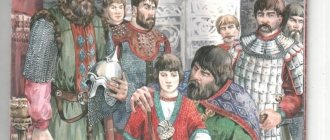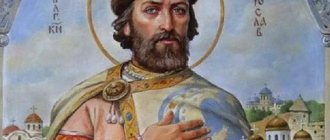A series of incursions of Mongol troops into the territory of ancient Russian principalities in 1237 - 1240. had a fateful historical significance for Rus'. The actual devastation of the southern and northeastern principalities, the destruction of almost half of the cities, the death of a huge number of civilians is only an incomplete list of direct losses suffered by the Russian states.
Mongol army on the march. (www.beijingwalking.com)
Rus' and the conquerors
The political consequences were no less significant. From now on, the policy of the Russian princes depended on the desires and plans of their Mongol masters. Now the “label”, which allowed the scions of noble families to manage their fiefdom, was issued directly in the Golden Horde (this state formation would finally take shape by the 60s of the 13th century). Trips of princes to the headquarters of the suzerain khan from then on became commonplace. In addition, these travels were one of the levers of political pressure of Batu’s successors - in fact, the Russian rulers found themselves hostages and were forced to accept the conditions of their patrons.
Often the Mongol owners of the Russian land resorted to the direct elimination of princes who, in their opinion, were unreliable. It was most convenient to do this at the khan’s headquarters. During the first half-century of the yoke, the Horde eliminated at least four prominent Russian princes.
Khan Batu is a fantasy of a modern artist. (asiarussia.ru)
Yaroslav returns to Novgorod
Mstislav left Novgorod in 1218 and went to Galich. Troubles began again among the Novgorodians. To stop them, I had to ask Yaroslav again from Yuri Vsevolodovich. The prince was again sent to them in 1221. The Novgorodians were delighted with him, according to the chronicler. When the prince went to his volost in 1223, they bowed to him and begged him to stay. However, Yaroslav did not listen to them and left for Pereyaslavl-Zalessky. In 1224, the Novgorodians managed to invite him to their place for the third time. Yaroslav appeared and stayed this time in Novgorod for about three years, defending this volost from various enemies. In the photo below - Yaroslav Vsevolodovich in front of Christ with a model of the Church of the Savior.
Khan Batu - Yaroslav Vsevolodovich. Kurultai of 1246
Yaroslav Vsevolodovich found himself reigning in Vladimir after the death of his brother Yuri, who actively opposed the invasion of invaders from the East. During the second invasion of South-Eastern Rus', he did not oppose anything to the nomads, apparently realizing that he no longer had the strength to resist.
Grand Duke Yaroslav Vsevolodovich. (aminpro.ru)
Alexander Nevsky's father became the first Russian prince to visit Batu's headquarters after the end of the invasion. In 1243, the Mongols recognized the great reign of Kiev for Yaroslav, but he chose to remain in Vladimir, his ancestral fiefdom, appointing a governor in Kyiv. Thus, the process of moving the political center from the ancient capital of Rus' to the main city of the Vladimir-Suzdal principality reached its final result.
However, Yaroslav a few years later, in 1246, was again summoned to Batu’s headquarters. It must be said that by this time several parties were formed depending on the attitude towards the conquerors: the conditional “pro-Horde” and “anti-Horde”. Yaroslav Vsevolodovich, already recognized as the “chief” in the territory of vassal Rus', tried to maneuver between the leaders of these movements. Thus, Daniil Galitsky and the Chernigov prince Mikhail Vsevolodovich did not take active steps to get closer to Batu, counting on the help of Europe. On the other hand, the Rostov princes quickly recognized the supremacy of Karakorum. Assessing the policy of the Vladimir princely house, historian V.V. Kargalov comes to the conclusion that “the great princes of Vladimir, after formally recognizing the power of the Golden Horde khans, tried to oppose Mongol-Tatar rule, and the fact of recognition of this power did not actually mean the establishment of a foreign yoke over the country " However, no documentary evidence of Yaroslav’s speech against the overlord has yet been found.
S. V. Ivanov. "Baskaki". 1909. Source: (ru.wikipedia.org)
In 1245, the Mongols summoned a large number of Russian princes to the Horde, among whom was Yaroslav. Apparently, this action was associated with the final establishment of the legal basis for the subordination of the Russian principalities to the power of the conquerors. Daniil Galitsky, having escaped the pagan rite of “purification by fire,” was able to receive a label for reign. Prince Mikhail of Chernigov accepted martyrdom. Yaroslav, in turn, was sent to participate in the kurultai in the capital of the Mongol state, Karakorum.
In 1246, at a general meeting of Mongol leaders, a new khan was elected - Guyuk, the grandson of Genghis Khan, who did not have the best relations with Batu. Yaroslav Vsevolodovich, as a tributary of Batu, found himself involved in the Mongolian political system, including Mongolian palace intrigues.
Khan's Palace in Karakorum. 18th century artist. (xponolog.blogspot.com)
The Italian traveler John de Plano Carpini, who later wrote “The History of the Mongols,” left memories of the Vladimir prince’s stay at the khan’s headquarters. He indicated that Yaroslav was invited to the table of Guyuk Khan's mother. She “gave him food and drink from her own hand as a sign of honor.” After this meal, the Russian prince felt unwell and died 7 days later, on his way home.
John de Plano Carpini. Source: (homsk.com)
Arrival of Yaroslav in Novgorod, renunciation of reign
In 1215, the Novgorodians invited Yaroslav to reign. Mstislav Mstislavich Udaloy, who had just left this city, left many of his supporters in Novgorod. As soon as he appeared, Yaroslav Vsevolodovich ordered the two boyars to be imprisoned. Then he convened a meeting against Yakun Namnezhich. The people began to plunder his yard, and the boyar Ovstrat and his son were killed by the residents of Prusskaya Street. Yaroslav did not like such self-will. He did not want to stay in Novgorod any longer and went to Torzhok. Here Yaroslav began to reign, and sent a governor to Novgorod. In this case, he followed the example of his father, grandfather and uncles, who left Rostov and established themselves in new cities.
Is the Pope responsible for the murder of the prince?
Russian chronicles, reporting the death of the Grand Duke, indicate that he was slandered by a certain Russian nobleman - Fyodor Yarunovich. Unfortunately, science does not have detailed information about this man, but it is known that the punishment for betrayal overtook the boyar very soon - after arriving from Karakorum, he was killed on the orders of the remaining sons of Yaroslav Vsevolodovich, Andrei and Alexander.
Historians are still arguing about the reasons that prompted the new khan to take the life of the Vladimir prince. However, it is necessary to point out several facts that appear to have influenced this decision.
It is likely that Yaroslav Vsevolodovich fell victim to political intrigues within the ruling elite of the Mongolian state. Batu was an opponent of the elected Khan Guyuk, and did not go to the kurultai. Thus, the Vladimir prince was left without even nominal protection in the very center of a hostile state. In turn, Guyuk's mother, Doregene, considered Yaroslav Batu's faithful man. That is why the Grand Duke had little chance of leaving the capital of the Khanate alive.
Still, what kind of denunciation allowed Yaroslav to be sentenced to death? The witness of the incident, the Italian diplomat Carpini, does not answer this question in his book. However, in a letter from Pope Innocent IV to Alexander Nevsky discovered in the 20th century, the pontiff informed the son of the murdered prince that he had converted to Catholicism just before his death. This fact was not covered in any way in other sources, but one can assume with almost complete certainty that Yaroslav Vsevolodovich maintained contacts with European anti-Horde forces. Perhaps it was this episode in the biography of the Vladimir prince that became the reason for his murder. But now it is not possible to say reliably what became the true pretext for the liquidation of the Grand Duke.
Reconciliation with Mstislav and Vladimir
Yuri, meanwhile, handed over Vladimir to the Mstislavichs. Konstantin, his brother, stayed here. Yuri went to Radilov, located on the Volga. However, Yaroslav Vsevolodovich did not want to submit. He decided to lock himself in Pereyaslavl, believing that he would sit out here. However, when Konstantin and Mstislav headed towards the city, he got scared and began to ask them for peace, and then he himself came to his brother Konstantin, asking him not to extradite Vladimir and Mstislav and to shelter him. Konstantin reconciled him with Mstislav on the road. When the princes arrived in Pereyaslavl, Yaroslav and the governor presented them with rich gifts. Having taken the gifts, Mstislav sent for his daughter, Yaroslav’s wife, to the city. Yaroslav asked him many times to return his wife, but Mstislav turned out to be adamant.
Patience and humility
Yaroslav became the “first sign”: internal Horde intrigues will often become the cause of the death of Russian princes.
Despite the sad outcome, the tactics of Yaroslav Vsevolodovich would become fundamental for Russian princes for a century and a half. Rebels like the princes of Tver, who periodically allowed themselves to disobey, found themselves on the sidelines of the main process.
Moreover, the obedient owners of the label, together with the Horde members, led their squads on punitive campaigns against those who tried to fight.
“Cursed seed, you little treacherous souls!” - the patriotic reader will exclaim in anger. But it will turn out that it is from this humility and conservation of strength that victory on the Kulikovo Field will be born.
Heir to the Ruined Land
Duke of Vladimir Yuri Vsevolodovich in the Battle of the City River left Russia without a “first among equals.” The deceased was succeeded by his younger brother Yaroslav Vsevolodovich .
The 47-year-old prince had extensive experience of reigning in various cities and participating in civil strife. At the age of 10, his father, Vsevolod the Big Nest , sent Yaroslav to reign in Pereyaslav, where there were constant skirmishes with the Polovtsians. The young prince had to prove that, despite his young age, he was capable of fighting and winning.
Then there were reigns in Ryazan, Pereslavl-Zalessky, Veliky Novgorod, constant struggle with friends and foes. In 1234, Yaroslav Vsevolodovich, who led the Novgorod-Vladimir army, defeated the knights of the Order of the Sword in the battle on the Omovzha River.
As a result, a peace treaty was signed between Novgorod and the order, according to which the eastern and southern part of the lands of the Dorpat bishopric went to Pskov.
In 1236, Yaroslav Vsevolodovich made a successful campaign against Kyiv and became its prince. While he was enjoying the victory, the Horde were already defeating Volga Bulgaria.
"Living Tribute" of the Golden Horde. “Friendship of Peoples” was forged through captivity and slavery Read more
Conquest of the Germans
Yaroslav in 1234 opposed the Germans with the Novgorodians and his regiments. He went to Yuryev and settled down not far from the city. He sent his people to fight in the surrounding areas and collect food supplies from them. Some of the Germans made a sortie from Odenpe, others from Yuryev, but the Russians beat them. Some Germans fell in the battle, but most died in the river when the ice broke off beneath them. Taking advantage of the victory, the Russians devastated the land. They destroyed the German grain, and this people had to submit. Yaroslav made peace with the Germans on terms favorable to himself.
Accepting reality
The invasion of Batu , which occurred in the fall of 1237, was observed by the Grand Duke of Kiev from the sidelines, without taking part in the events.
Having learned about the death of Yuri, Yaroslav Vsevolodovich arrived in Vladimir to accept the reign by right of seniority. However, there was no one in particular to challenge the right to power in the devastated lands.
Until then, the Russians had to experience the bitterness of defeat, but there was nothing comparable. And Yaroslav had to make a decision about what to do next.
Desperate heads who survived the first wave of the invasion dreamed of a new battle. But Yaroslav thought differently. When the Horde appeared again, he did not interfere with their robberies and did not engage in battle. The prince and his retinue went to Smolensk to knock out the Lithuanians, who had captured the city immediately after the defeat of the Russians in the City. This campaign was successful.
As for the Tatars, Yaroslav Vsevolodovich showed them the obedience that they did not expect from Yuri and those who fought fiercely in 1237-1238. In a certain sense, the prince became the first Russian collaborationist.
Victory or death. 8 battles in which the fate of Russia hung in the balance Read more
Fight against Lithuanians
Lithuanians numbering 7 thousand in 1225 devastated the villages located near Torzhok. They did not reach the city itself only three miles. The Lithuanians killed many merchants and subjugated the entire Toropetsk volost. Yaroslav Vsevolodovich caught up with them near Usvyat. He defeated the Lithuanians, killed 2 thousand people and took away the loot they had stolen. In 1228, Yaroslavl left for Pereyaslavl, leaving his sons in Novgorod. The inhabitants of the city again sent for him in 1230. The prince arrived immediately, vowed to fulfill everything he had promised, but was still not constantly in Novgorod. His place was taken by his sons Alexander and Fedor.








